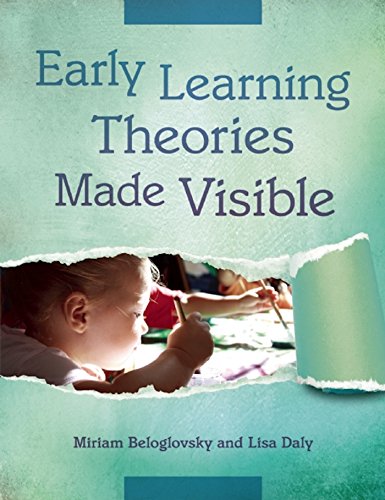Is Howard Gardner the most misunderstood and misappropriated educationalist (his preferred term) in the world today or he just the only theorist most educators have heard of?
Today, two different pieces of reading started me thinking about Howard Gardner.
- A lovely interview/profile of Gardner in the Harvard Gazette, “The greatest gift you can have is a good education, one that isn’t strictly professional“
- A beautiful 2015 book, “Early Learning Theories Made Visible,” by the authors of the glorious “Loose Parts” trilogy. (Beloglovsky & Daly)
 At first glance, the Beloglovsky and Daly book represents an impressive way of teaching learning theories to preservice and inservice educators. They identify a half dozen or so leading learning theorists, provide a brief description of their theories, and then through field examples, explore how those theories may be actualized in classroom practice. My initial thought was, “Why doesn’t anyone take a similar approach to educational psychology for elementary and secondary teachers?” Seriously!
At first glance, the Beloglovsky and Daly book represents an impressive way of teaching learning theories to preservice and inservice educators. They identify a half dozen or so leading learning theorists, provide a brief description of their theories, and then through field examples, explore how those theories may be actualized in classroom practice. My initial thought was, “Why doesn’t anyone take a similar approach to educational psychology for elementary and secondary teachers?” Seriously!
It seems odd that the least paid and respected folks in education, early childhood teachers, seem to receive the richest exposure to learning theory. But, I digress.
Howard Gardner is one of the seminal theorists used in Early Learning Theories Made Visible and the author’s explanation and application of his multiple intelligences theory is a bit of a mess. (Discussions of multiple intelligences theory are often a confusing mess.) It seems as if the authors were so desperate to avoid wading into the fake controversy regarding “learning styles,” popular across social media and ed schools who hate children, that they initially just call the theory MI, assuming that all of their readers know what MI means. Then predictably, many of the examples of MI in the book are about pedagogy, not learning. In any event, the Early Learning Theories Made Visible is impressive and a worthy addition to your library, even if the first chapter could have benefited from a critical friend.
I highly recommend reading the new Harvard profile of Howard Gardner. Long-form interviews of thoughtful experts blessed with rich lives and professional success are always a great read.
One comment in that profile stood out for me.
“I’ve been able to write a lot. I wrote three books when I was in graduate school, which was very unusual. I’m more a book person than an article person.” (Howard Gardner)
Gardner’s thoughts on his written output made me think. Perhaps such prolific writing has obscured his ideas?
Gardner’s best ideas might be the ones reducible to a t-shirt slogan. For example, Multiple intelligences theory simply means that intelligence cannot be measured in one way.
Less might indeed be more.
I highly recommend that everyone read an incredibly important and sadly overlooked anthology,”MI at 25: Assessing the Impact and Future of Multiple Intelligences for Teaching and Learning.” This book contains essays by experts making cogent thoughtful arguments for and against multiple intelligences theory.
References
Beloglovsky, M., & Daly, L. (2015). Early Learning Theories Made Visible: Redleaf Press.
Mineo, L. (2018). The Greatest Gift You Can Have is a Good Education, One that isn’t Strictly Professional. Experience. Retrieved from https://news.harvard.edu/gazette/story/2018/05/harvard-scholar-howard-gardner-reflects-on-his-life-and-work/
Shearer, B. (2009). MI at 25: Assessing the impact and future of multiple intelligences for teaching and learning: Teachers College Press.
Veteran educator Dr. Gary Stager is co-author of Invent To Learn — Making, Tinkering, and Engineering in the Classroom and the founder of the Constructing Modern Knowledge summer institute. Learn more about Gary here.
Veteran educator Gary Stager, Ph.D. is the author of Twenty Things to Do with a Computer – Forward 50, co-author of Invent To Learn — Making, Tinkering, and Engineering in the Classroom, publisher at Constructing Modern Knowledge Press, and the founder of the Constructing Modern Knowledge summer institute. He led professional development in the world’s first 1:1 laptop schools thirty years ago and designed one of the oldest online graduate school programs. Gary is also the curator of The Seymour Papert archives at DailyPapert.com. Learn more about Gary here.



Hi Dr. Stager,
Thanks for the post-script mention of my book, MI@25. Much appreciated. You express my thoughts precisely about this book. I thought the authors did a marvelous job analyzing MI and was very disappointed when few people paid attention.
” . . . important and sadly overlooked anthology,”MI at 25: Assessing the Impact and Future of Multiple Intelligences for Teaching and Learning.” This book contains essays by experts making cogent thoughtful arguments for and against multiple intelligences theory.”
I worked hard when it was published to get it noticed, but, alas was not successful. TCP wasn’t much help either. Hard to find the right audience in a noisy world.
I’m working now on “something” to mark MI@35, but it is a slog. I really agree with you that both Howard and MI are misunderstood — intentionally so in some cases. The concept of intelligence has such deep policy (political) and ego tentacles. I have this theory that it is time to end the IQ vs. MI combat and that they actually are compatible. I say this after reviewing a wealth of neuroscience evidence.
Shearer, C. B. and Karanian, J.M. (2017). The neuroscience of intelligence: Empirical support for the theory of multiple intelligences? Trends in Neuroscience and Education, Vol. 6, March 2017, Pages 211–223. https://doi.org/10.1016/j.tine.2017.02.002
Thanks for the mention!
regards, Branton Shearer